In 5th grade at my elementary school, my class did a project built around the novel we were reading as a group, Un gomme bien ordinaire by Danièle Desrosiers. The Toy Story-esque plot of the book followed a sentient eraser as she navigated her life in a school classroom. We were tasked with taking an already existing pop song and re-writing the lyrics in French to be about the novel.
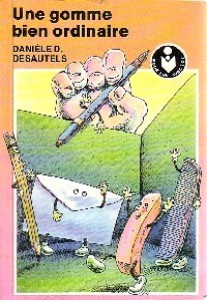
Early on in the project, our teacher asked each duo of students to announce which song they would be using. Predictably, most of the students chose Top 40 music because it was all that we were familiar with at that age. My friend Paul and I initially chose “Oh Hell Yeah” by H-Blockx because it was Stone Cold Steve Austin’s entrance music, but we later opted for Smash Mouth “All-Star”, as the melody was much easier to work with. Two of my classmates announced that they would be using “What’s My Age Again?” by blink-182. Our teacher had been stumped by many of the kids’ choices and again asked for clarification as to who this band was. The two boys responded with “the band that runs around naked” and she instantly understood.
I had heard the band’s name before this and recognized it, from where I don’t know, but for all intents and purposes, this was my introduction to the band. Shortly after this I saw the video for “What’s My Age Again?” on MuchMusic, which was followed by the one for “All the Small Things” shortly after that.
I’m not sure what or when my introduction to pop-punk music was. There was the above instance with blink-182, I heard Jimmy Eat World’s “The Middle” in the trailer for the very early-00’s comedy The New Guy, and somewhere in there I saw the video for Sum 41’s “Fat Lip”. It’s less important that I had any sort of formative “a-ha!” moment with the music than the fact that I took to it instantly and blink figured prominently in this.
As a 12-year-old Catholic child, blink-182 was extremely exciting to me because it was the first expression of rebellion that I felt I could relate to. I loved that they lampooned the music videos of popstars because I found those videos to be so stupid and unrelatable.* By having their entire video consist of their less-than-ideal male bodies running naked through an urban environment, it seemed like they were lampooning the entire idea of music videos and that was funny. The band seemed like the musical equivalent of the raunchy comedies I was already a fan of, like Caddyshack or American Pie (even beyond their brief cameo while “Mutt” plays).
*I am aware of the irony of blink-182, who were massive popstars themselves doing this. More on that later.
This form of tepid, irreverent rebellion was like catnip for cis-gendered, heterosexual white teenagers. We thought that they were doing something ground-breaking, but they were really an exaggerated reflection of ourselves. The band’s antics, like Tom peeing himself live on MuchMusic (beside Mark in baggy Dickies and a Lagwagon shirt swoon), hooked me right away and made the poppy, high-production punk of Enema of the State an extremely easy sell.
I downloaded the band’s singles on Napster and added them to my humble 12-song-ish playlist Tim’s Songs, which represented my entire musical knowledge at this time. Shortly after that, a friend brought over his older sister’s copy of Dude Ranch and I was hooked for life. Brief periods of me being “too punk” for them came and went, but I’ve never even approached getting out of the boat. I grew from liking the juvenile songs to liking the more melodic songs about girls as I started dating, and then once I got old enough I realized how juvenile some of those are too.
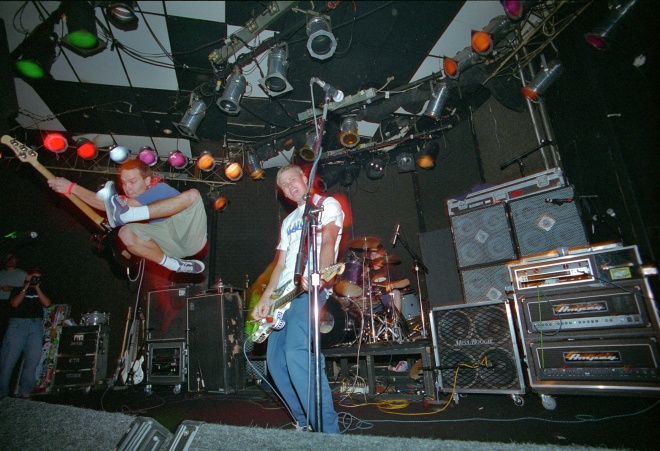
It’s a trip to look back on the band now, since it appears they are entering the last stage of a massively successful band’s narrative arc. Tom has been ousted and replaced with the pop-punk equivalent of Brian Johnson in Matt Skiba, they enlisted a successful producer and laundry list of co-writers to put out a “return to form” album in California, and to top it all off they recently began a residency at a casino in Las Vegas. I never thought I would see the day when a punk band moved in on Celine Dion and Britney’s turf, but here we are.
These are not the things that your “favourite band” does, but rather those of established cultural touchstones. Music writers and critics may pooh-pooh the notion that the band that played in front of a giant flaming “FUCK” sculpture is a cultural touchstone, but I feel that the band’s Vegas residency has cemented this notion. As with many bands of their status, blink has left an indelible mark on their genre and the generation of teenagers who grew up listening to them. A lot of people around my age started bands because they wanted to be like Mark and Tom. A lot of people started YouTube channels because they thought they were as funny as Mark and Tom. The scope of their influence is as wide as it could possibly be.
This essay is partly inspired by the podcast Blink-155, which discusses one blink-182 song per episode, there is 155 in all, with the goal of covering the band’s entire catalogue. While the podcast began as a relatively straight-forward discussion of the songs, it has turned into a greater sociological examination of pop culture since the turn of the century. Blink-182 has affected such a huge number of people that by investigating the band, should you go deep enough, you are investigating society itself.
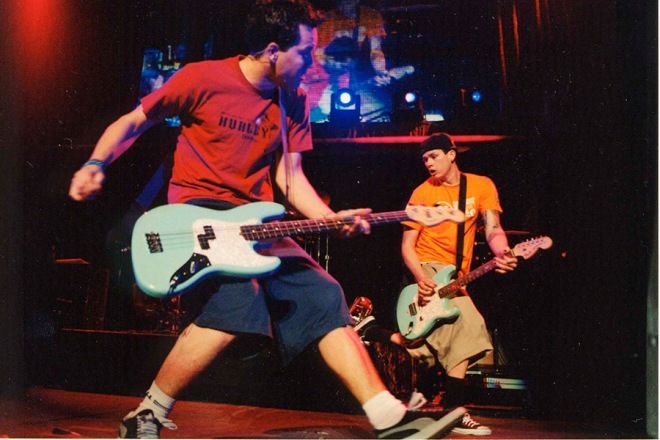
Blink’s effect on pop-punk music dwarfs any other band who has operated within the genre, even other supergiants like Green Day or Fall Out Boy. They enjoyed a crazy, multi-wave rollout of influence since the initial success of Dude Ranch in 1997, where a multitude of bands in the late-90’s and early-00’s clearly aping their sound, like New Found Glory, SR-71, Fenix-TX, or Canada’s equivalent Sum-41, were all signed immediately and permeated Top-40 radio. Once Enema of the State cemented blink’s status as a radio presence, they became the template for teens starting their first punk band, in the same way that every reggae band starts out by copying Sublime and every hardcore band starts out by copying Hatebreed. With blink’s signature guitar and bass models released by Fender in the early 00’s, many of these kids were almost literally cosplaying the band as they started to play music.
This scope of influence is still apparent in pop-punk music today. A large part of blink’s success is that they simplified punk song structure to make it palatable to a large audience: Intro guitar riff, verse in the song’s major key, chorus in a minor key, short bridge, back to the chorus and out. In contemporary punk music, pop-punk is still the industry’s main workhorse, as bands like A Day to Remember or The Story So Far and their ilk dominate bigger festivals like Riot Fest and Warped Tour and are some of the few that can make touring through the rest of the year feasible. When you break it down, most of these bands still revert back to the “blink” formula, relying on hammer-on guitar riffs and the tried-and-true I-V-vi-IV chord pattern, which I’ve heard called the ‘pop-punk T’ because of its structure on a guitar fretboard many times.
There is also an ugly side to blink’s enduring influence as well. Along with copying blink’s musical style, bands were also eager to copy the band’s onstage comedy shtick. As anyone who went to a local concert in the 00’s can attest, almost every band thought that taking 3 minutes in between songs to tell jokes about their dicks was par for the course. The problem, of course, was that these bands were nowhere near as funny or charismatic as blink, whose gimmick was a little tired and flawed to begin with. As a result, the casual sexism and homophobia of blink’s comedy quickly imbued itself in a generation of kids starting bands.
The turn of the millennium was a different time in terms of what was acceptable in comedy. North American culture is nowhere near perfect now in terms of not treating people like garbage for the way they are, but we were much worse 20 years ago and this is reflected in the things blink-182 said while they played. Of course, one can also argue that blink’s sense of humour was more of a reflection of the environment they grew up in, rather than any malicious intent (you could argue it wasn’t malicious given Mark’s slightly more socially conscious stance now), but their status as popstars made them a major force in perpetuating harmful gay panic and sexist tendencies in jokes. When I was a pre-teen, my friends and I called each other “gay” constantly because we saw the band (and movies and TV and people around us) do it. Every local punk band felt the need to poke fun at how “gay” the rest of their band members were because Mark and Tom did it after pretty much every song that they played.
Sexism carried over even more in their songs than in their humour. Pop-punk is a musical genre that relies on love songs to exist. Almost every big single from a notable pop-punk band is about either falling in or out of love and if it isn’t about that, then it’s about wanting to defy your parents. This reliance on writing “songs about girls” makes the genre hostile towards women. When every song you hear is about how a young man has been wronged by his ex-girlfriend, it’s inevitable that the people listening to those songs will start to villanize women.
The problem is that most of the teenagers who grew up as fans of blink-182 and started pop-punk bands indebted to their favourite band didn’t understand the nuance of saying “I’m sad that we broke up” instead of “I hate you because we broke up”. Blink-182 was their primary example of masculinity. Dumb kids think that writing “songs about girls” means “writing songs about hating girls” and since most of their fans are young men, nobody calls attention to it. An obvious example of this would be The Story So Far, a very popular band in their own right, having the lyric “and to think that you’re somebody’s daughter, away at college not getting smarter” as the chorus to one of their songs. I also remember a band from Ontario naming one of their releases All My Exes Are Dead to Me, with the title track being them just repeating that line over and over. Why would you write a song insulting the very person you are so clearly desperate to get back? Aside from how stupid and problematic that is, it also makes it obvious that you define yourself only by your relationship to that person.
Sexist tendencies didn’t just come out in trying to write love songs. A lot of these same teenaged boys also idolized the non-musical side of blink-182, and the clips of Mark and Tom hanging out while on tour were just as influential on their behaviour as the records. Playing pranks on each other backstage and making stupid inside jokes were as much a part of the dream of being in a band as playing songs together. Again, young males loved this because it was a reflection of themselves and we all believed we could be goofing off just like Mark and Tom if we “made it” too. In their heyday, blink-182 was as much an exultation of male bonding and friendship as it was anything else, but by putting this male bond on a pedestal, it created an exclusionary environment for women. Women were relegated to being the subjects of the songs on the records, rather than being part of the much more sacred ground of hanging out together. Some women could perhaps work their way into the scene by being “one of the guys”, but that also stipulates that they would have to act like men in order to be accepted. Even if they are accepted, most women’s interest in the music is considered dubious by the men in the scene. On top of that, if a girl became part of a scene, it was often not long before they became the object of a pop-punk boy’s affection, fast-tracking their life towards being the subject of All My Exes Are Dead to Me.
I realize that some of these arguments I’m making seem like sweeping generalizations, but I feel like I’m able to say these things because I was one of these boys in high school and was immersed in the scene I’ve been talking about as a young adult. I saw all these bands do exactly what I’m saying.
Many of these boys believed that they were better than pop music fans because pop music was created for mass-consumption by a record label, whereas blink were a “real band”, which is hilarious in hindsight. Blink’s rise through Southern California’s punk scene culminating in Dude Ranch is as good of a feel-good story that there is, but to consider their Enema-and-after output as anything other than major label pop music is laughable. There were a boy band for the teenagers who thought that they were too cool for boy bands. Songs were simplified music and lyric-wise to be as palatable as possible, Jerry Finn put a sheen of production over the records that made “punk” sound like Journey, and the vocals were auto-tuned to all hell. To think that so many people thought they had the moral high ground because they listened to the pop band with tattoos breaks my brain.
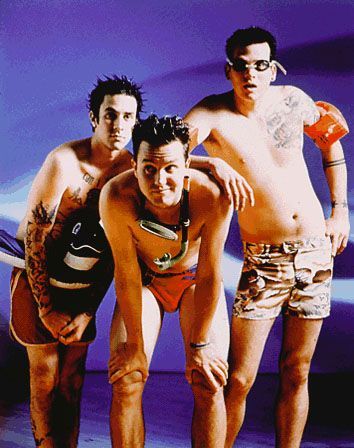
But if these are all the bad things about blink’s influence, then what are the good things?
This is tricky because here I can only speak from my own experience and some of the things that were a positive experience for me may well have been negative for someone else.
The most significant thing that blink contributed to my life was that they represented a sexual awakening. Not that I was attracted to any of the members, but that they were unabashedly sexual beings and as a 12-year-old Catholic teenaged boy, I was not. They talked about sex constantly and made it seem cool. Up to this point in my life, I was to understand that girls were gross, and sex was a taboo thing I should never think about. Blink-182 made me consider otherwise.
When I saw the cover for Enema of the State, I thought, in this order, “that’s sex”, “I like that”, and “oh, now I have to think about this”. Though I’m sure most people who see Enema’s cover see it as a vivid sexist reflection of the band at the time, I instead saw it as confrontational, as it forced me to think about myself as a sexual being and to think about my body. I’m sure that I’m not alone in this, even if it mostly manifested itself as guys saying “Janine Lindemulder is hot”.
Blink were also unafraid to show off their bodies at every opportunity, with the most obvious example being the music video for “What’s My Age Again?” In their stage banter, Mark and Tom would also self-effacingly draw attention to how “sexy” and good-looking” they were. It was clear that they were doing this because they (well, at least the two of them and not Travis) were far from the typical idealized male form perpetuated by the mainstream media and that by joking about it, they could avoid criticism. Because blink thought of their bodies as silly and were eager to draw attention to them, I did the same. It seems innocuous, but it was crucial, as it gave me some way to approach my own body.
My experience as a young male was being taught that your body is inherently unsexual. This creates problems when you begin puberty because you are completely unsure how to approach yourself and over-sexualize the bodies of women because that is what media has taught you to do. Blink bucked at least half of that scenario by teaching boys that it’s okay to love yourself and feel comfortable in your body.
This is best summed up in a video that Blink-155 drew my attention to. In the video, three boys shirtlessly cover blink’s song “Happy Holidays You Bastard”, acting out blink-style juvenile comedy and expertly miming oral sex. Of all the pieces of media on the internet, this is one of the ones that I relate to most, as I feel like my friends and I were one camcorder away from making it ourselves. It’s hard to think of anything more beautifully suburban than three boys shirtless in a shower badly covering a song about a relative pooing their pants for the likes on Youtube.
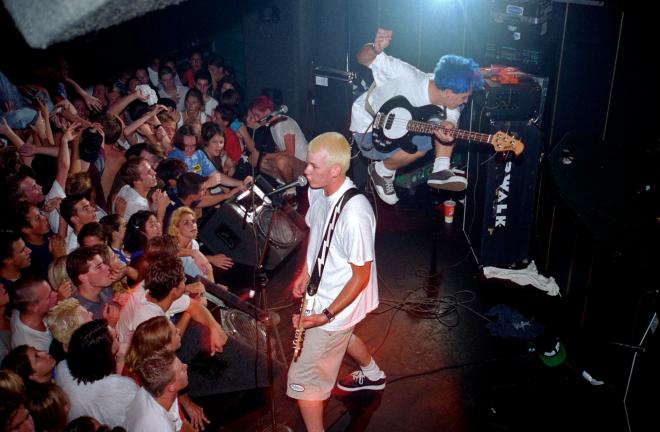
It’s hard to come to a conclusion about the nature of blink-182’s influence. They single-handedly inspired my friends and I to start playing music, which many of us have continued to do as we approach our 30’s, but it’s impossible to separate them from all of pop-punk’s worst aspects. This is especially true this year, as a disproportionate amount of sexual abuse, assault, and manipulation claims against members of pop-punk bands have come to light. It’s impossible to make any sort of decisive conclusion about blink’s enduring influence because they’ve gotten so big that the influence has been scattered among millions of people and trying to group all of them together for examination is foolish. Instead, you just have to sit back and marvel at the fact that the band who wrote “Reebok Commercial” sold that many records.